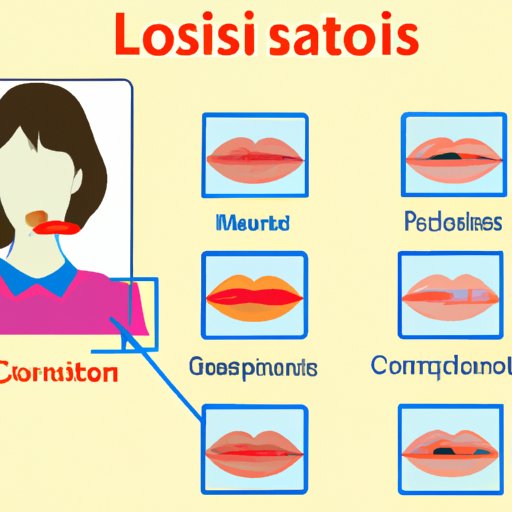Introduction
Cold sores, also known as fever blisters, are a common and highly contagious infection caused by the herpes simplex virus (HSV). They are small red blisters that appear on the lips or around the mouth, and often cause pain and discomfort as well as embarrassment. Knowing when cold sores are most contagious is essential for preventing the spread of the virus and avoiding outbreaks.
How to Identify When a Cold Sore is Most Contagious
Cold sores are most contagious during the active stages of infection, which can be divided into three different phases: tingling, blistering, and healing. The tingling phase is characterized by a burning or itching sensation, followed by the appearance of small red bumps or blisters. During this stage, the virus is most contagious and can easily be spread through skin-to-skin contact or contact with contaminated surfaces. The blistering phase occurs when the blisters burst and form a crusty scab, and the healing phase is when the scab falls off and the area begins to heal.

Understanding the Risk Factors for Cold Sores
In addition to understanding the transmission stages of cold sores, it’s important to understand the risk factors that can increase your chances of contracting the virus. These include being in close contact with an infected person, having a weakened immune system, being exposed to wind or sun, and having certain medical conditions such as cancer, HIV/AIDS, or diabetes. People who have been diagnosed with HSV-1 are more likely to experience frequent and severe outbreaks.

Tips for Preventing Cold Sore Spread
The best way to prevent the spread of cold sores is to practice good hygiene. This includes washing your hands regularly, avoiding sharing items such as utensils, drinks, or makeup, and avoiding direct contact with other people. If you do come into contact with someone who has a cold sore, make sure to wash your hands immediately.
What You Should Know About Treating Cold Sores
There are several options available for treating cold sores, including over-the-counter medications, prescription medications, and home remedies. Over-the-counter medications such as topical creams and ointments can help reduce the duration and severity of symptoms. Prescription medications such as antiviral pills may be prescribed if the infection is severe. Home remedies such as applying ice or lemon balm can also provide relief from symptoms.

Strategies for Managing Cold Sores During Contagious Periods
If you know you are going to be in a situation where you may come into contact with someone who has a cold sore, there are several steps you can take to reduce your risk of infection. Early detection is key, so be aware of any changes in your skin and seek medical attention if necessary. Additionally, keep the cold sore clean and dry, avoid touching it, and cover it with a bandage if necessary.
Conclusion
Cold sores are a highly contagious infection caused by the herpes simplex virus. Knowing when cold sores are most contagious is essential for preventing the spread of the virus and avoiding outbreaks. The virus is most contagious during the tingling stage, but proper hygiene and avoidance of direct contact with others can help reduce the risk of transmission. In addition, there are several treatment options available for managing cold sores during contagious periods. By understanding the risk factors and taking the necessary precautions, you can reduce your chances of contracting and spreading the virus.


